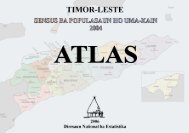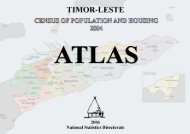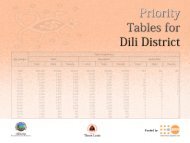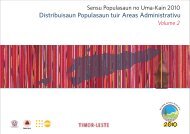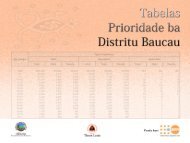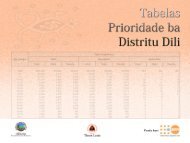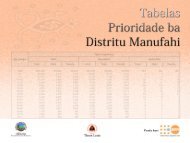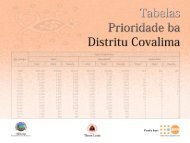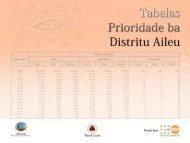Demographic and Health Survey 2009-10 - Timor-Leste Ministry of ...
Demographic and Health Survey 2009-10 - Timor-Leste Ministry of ...
Demographic and Health Survey 2009-10 - Timor-Leste Ministry of ...
You also want an ePaper? Increase the reach of your titles
YUMPU automatically turns print PDFs into web optimized ePapers that Google loves.
DOMESTIC VIOLENCE 16<br />
In the words <strong>of</strong> former United Nations Secretary General, K<strong>of</strong>i Annan, “violence against<br />
women is perhaps the most shameful human rights violation. And it is perhaps the most pervasive. It<br />
knows no boundaries <strong>of</strong> geography, culture, or wealth. As long as it continues, we cannot claim to be<br />
making real progress towards equality, development, <strong>and</strong> peace” (UNIFEM, 2003).<br />
The World <strong>Health</strong> Organization (WHO) defines domestic violence as “the intentional use <strong>of</strong><br />
physical force or power, threatened or actual, against oneself, another person, or against a group or<br />
community, that either results in or has a high likelihood <strong>of</strong> resulting in injury, death, psychological<br />
harm, mal-development, or deprivation” (Krug et al., 2002). Domestic violence is defined here as any<br />
act <strong>of</strong> violence resulting in physical, sexual, or psychological harm or suffering to women, girls, <strong>and</strong><br />
also men, including threats <strong>of</strong> such acts, coercion, or arbitrary deprivation <strong>of</strong> liberty.<br />
Domestic violence is the most common form <strong>of</strong> gender-based violence in <strong>Timor</strong>-<strong>Leste</strong>.<br />
Studies have indicated that <strong>Timor</strong>-<strong>Leste</strong> has a long history <strong>of</strong> culturally accepted forms <strong>of</strong> domestic<br />
violence. People prefer not to talk about domestic violence, as it is considered a private matter.<br />
Therefore, reporting on domestic violence is considered a societal taboo. It is expressed that<br />
“Gender-based violence is widespread in <strong>Timor</strong>-<strong>Leste</strong>, yet perpetrators are rarely punished. Family<br />
disputes <strong>and</strong> domestic violence is <strong>of</strong>ten considered a ‘normal,’ yet very private occurrence within the<br />
family” (Concern.net, 2008).<br />
It is not a common practice to seek justice through traditional justice systems; the perpetrators<br />
<strong>of</strong> gender-based violence cannot simply be punished or removed from the community. Often the<br />
family <strong>of</strong> the perpetrator gives animals (water buffalos, goats, or pigs) to the victim’s family. This gift<br />
opens an avenue <strong>of</strong> reconciliation that concludes with a ceremony, usually a feast, indicating that<br />
there are no more hard feelings <strong>and</strong> no need for social disturbances. After the conclusion <strong>of</strong> such a<br />
ceremony, the perpetrator is once again allowed to move around freely. A baseline study conducted in<br />
2007 in the two districts <strong>of</strong> Covalima <strong>and</strong> Bobonaro indicated that the patriarchal belief <strong>of</strong> women’s<br />
role in society, religion, <strong>and</strong> preconceived notions <strong>of</strong> sexuality make discussions <strong>of</strong> sexual <strong>and</strong><br />
gender-based violence nearly impossible (UNMIT, <strong>2009</strong>).<br />
After a concerted lobbying effort led by the Office <strong>of</strong> the Secretariat <strong>of</strong> State for the<br />
Promotion <strong>of</strong> Equality, the United Nations Population Fund (UNFPA), the United Nations<br />
Development Fund for Women (UNIFEM), UNMIT <strong>and</strong> local <strong>and</strong> international NGOs, the National<br />
Parliament in <strong>Timor</strong>-<strong>Leste</strong> passed a Law Against Domestic Violence on May 3, 20<strong>10</strong>, which came<br />
into force one month later. These efforts represented the culmination <strong>of</strong> seven years’ work, which<br />
involved harmonization with relevant provisions <strong>of</strong> the <strong>Timor</strong>ese Criminal Code. The Law Against<br />
Domestic Violence clearly states that crimes <strong>of</strong> domestic violence are public crimes <strong>and</strong> also provides<br />
for medical, legal, <strong>and</strong> psycho-social support for survivors. However, consideration <strong>of</strong> the law did not<br />
occur until <strong>2009</strong> after the penal code was approved which included domestic violence as a punishable<br />
crime for the first time under <strong>Timor</strong>ese or Indonesian rule (UNIFEM, 20<strong>10</strong>). The law was finally<br />
promulgated by the President on June 21, 20<strong>10</strong>.<br />
The <strong>2009</strong>-<strong>10</strong> TLDHS included a series <strong>of</strong> questions that focus on specific aspects <strong>of</strong> domestic<br />
<strong>and</strong> interpersonal violence. The module addresses women’s experience <strong>of</strong> interpersonal violence,<br />
including acts <strong>of</strong> physical, sexual, <strong>and</strong> emotional violence. Information was collected on both<br />
domestic violence (also known as spousal violence or intimate partner violence) <strong>and</strong> violence by other<br />
family members or unrelated individuals. Specifically, this chapter presents the findings on women<br />
who ever experienced interpersonal violence—physical violence since the age <strong>of</strong> 15, lifetime<br />
experience <strong>of</strong> sexual violence—<strong>and</strong> women who experienced partner violence ever <strong>and</strong> in the past<br />
12 months. In addition, detailed information is presented on partner violence, including the physical<br />
consequences <strong>of</strong> violence <strong>and</strong> when partner violence began.<br />
Domestic Violence | 225



